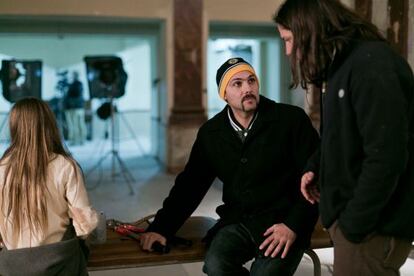Betting the house on a movie
Lucas Figueroa mortgaged his home to finance his debut feature, ‘Viral’

What would you be willing to do to get 100,000 fans on the social networks? That is the question Argentinean director Lucas Figueroa wants to answer in his debut feature, Viral. Now playing in theaters, the horror-comedy is the first movie in a planned trilogy from a filmmaker who holds the world record for the most prizes given to a short film (300) for his 2008 effort Porque hay cosas que nunca se olvidan (or, Because There are Things We Never Forget).
Viral stars actor Juan Blanco as Raúl, a contestant in an innovative competition: he has to live for a week in the giant Fnac entertainment store in Callao in the center of Madrid. If he leaves the building, he loses. He also has to use his stay to kick up a stir on the social networks.
However, he may not be alone. There is some kind of presence in the store with him, and along with sales assistant Lucía (Aura Garrido), he will have to find out whether it is an invention to attract more online attention or if there really is something lurking in the building that once housed the Galerías Preciados department store.
“I like the idea of being in a single place with a pathological condition,” Figueroa says, holding back on some of the detail to avoid spoilers. “With this location, we could play between fiction and reality,”
Figueroa holds the world record for the most prizes given to a short film
To do that he makes use of two well-known elements of Madrid history in the film: the tunnels that run beneath its streets, which mostly connected the city’s monasteries with each other, and the old 1943-founded department store that was a symbol of prosperity in the Franco era. It is up to the viewer to work out where the imagination of the director takes it all.
The subject of fans is a recurrent theme in the film. The nonsense that multinationals often come up with in viral campaigns to try to pick up followers is one of the movie’s story arcs. “The directors of Fnac are a bunch of sharks who try to exploit Raúl. You could say they are the bad guys in the film,” he says.
Despite the depiction of its bosses, Fnac did not hesitate in handing over its flagship store for the shoot. It was the only thing the firm gave to the movie. “The film is mostly venture capital. I had to mortgage my house. Everything I have,” says the director.
And it was that bet that convinced the brands to get behind his film: “When in a negotiation the question comes up of, ‘OK, but what are you bringing?’ I reply, ‘My home.’ When you mention that, they take you seriously and listen to you in another way.” The funding Figueroa has obtained since the start of the shoot in July 2012 has allowed him to begin the project, but he is still looking for capital to cover exhibition and production costs.
Figueroa says he feels no pressure about having to surpass himself after his previous world record achievement: “I don’t think about it, the awards thing is just an anecdote.” But he does admit that it acts as an incentive. Since he began his adventure he has focused all his time on the film — he knows that he is gambling with everything he owns. And what better incentive is that?
Whether or not he repeats his past success, time will tell. But what’s undeniable is that Figueroa is betting on himself.
Tu suscripción se está usando en otro dispositivo
¿Quieres añadir otro usuario a tu suscripción?
Si continúas leyendo en este dispositivo, no se podrá leer en el otro.
FlechaTu suscripción se está usando en otro dispositivo y solo puedes acceder a EL PAÍS desde un dispositivo a la vez.
Si quieres compartir tu cuenta, cambia tu suscripción a la modalidad Premium, así podrás añadir otro usuario. Cada uno accederá con su propia cuenta de email, lo que os permitirá personalizar vuestra experiencia en EL PAÍS.
¿Tienes una suscripción de empresa? Accede aquí para contratar más cuentas.
En el caso de no saber quién está usando tu cuenta, te recomendamos cambiar tu contraseña aquí.
Si decides continuar compartiendo tu cuenta, este mensaje se mostrará en tu dispositivo y en el de la otra persona que está usando tu cuenta de forma indefinida, afectando a tu experiencia de lectura. Puedes consultar aquí los términos y condiciones de la suscripción digital.








































